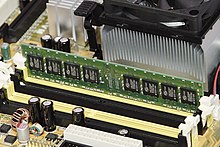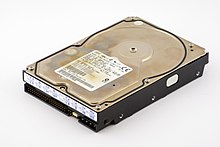



Computer data storage or digital data storage is a technology consisting of computer components and recording media that are used to retain digital data. It is a core function and fundamental component of computers.[1]: 15–16
The central processing unit (CPU) of a computer is what manipulates data by performing computations. In practice, almost all computers use a storage hierarchy,[1]: 468–473 which puts fast but expensive and small storage options close to the CPU and slower but less expensive and larger options further away. Generally, the fast[a] technologies are referred to as "memory", while slower persistent technologies are referred to as "storage".
Even the first computer designs, Charles Babbage's Analytical Engine and Percy Ludgate's Analytical Machine, clearly distinguished between processing and memory (Babbage stored numbers as rotations of gears, while Ludgate stored numbers as displacements of rods in shuttles). This distinction was extended in the Von Neumann architecture, where the CPU consists of two main parts: The control unit and the arithmetic logic unit (ALU). The former controls the flow of data between the CPU and memory, while the latter performs arithmetic and logical operations on data.
- ^ a b Patterson, David A.; Hennessy, John L. (2005). Computer organization and design: The hardware/software interface (3rd ed.). Amsterdam: Morgan Kaufmann Publishers. ISBN 1-55860-604-1. OCLC 56213091.
Cite error: There are <ref group=lower-alpha> tags or {{efn}} templates on this page, but the references will not show without a {{reflist|group=lower-alpha}} template or {{notelist}} template (see the help page).